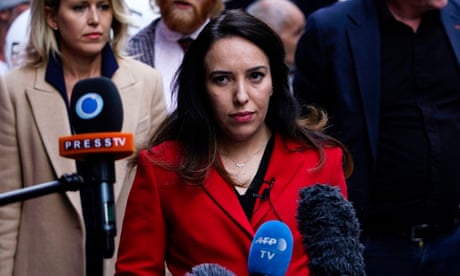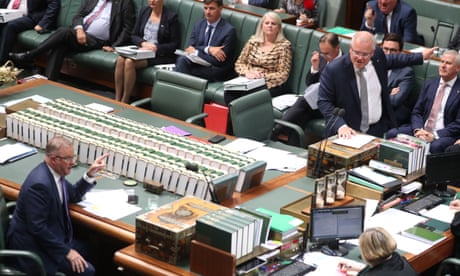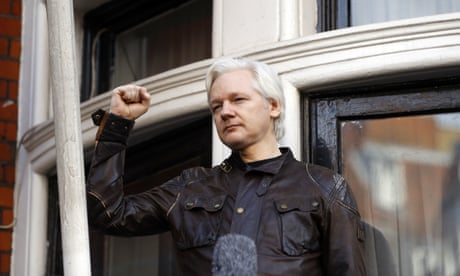A Liberal National party backbencher has called on the Australian government to lodge a formal protest with the US over the treatment of Julian Assange after a court heard claims of previous plans to poison or kidnap the Wikileaks founder.
After a former employee of a private security firm told an extradition hearing in London this week of those alleged discussions between sources in US intelligence and the company, George Christensen told Guardian Australia: “The latest revelations show a foreign power tried to use illegal means to harm an Australian citizen.”
Christensen and independent MP Andrew Wilkie met the British high commissioner to Australia on Friday to raise concerns about Assange’s welfare and question whether due process was being observed.
Wilkie tweeted after the meeting that the high commissioner, Vicki Treadell, had given the pair “a good hearing” and promised to report the concerns back to London:
Wilkie said there were limits to what a high commissioner could say in such situations, but Treadell “was very much in listening mode to hear our concerns” during the half hour video conference, while being mindful the matter was before the courts.
Wilkie said he and Christensen argued that Assange should not be extradited to the US and should be allowed to return to Australia – but if that was not to occur, the Wikileaks co-founder should be released into community detention and have full access to his legal representatives.
“I also spoke about how the UK, US and Australian governments are misjudging the community mood on this and the mood has shifted in recent times,” Wilkie said.
Assange is fighting extradition to the US on charges relating to leaks of classified documents allegedly exposing US war crimes and abuse.
“I’ve grown more and more concerned about Julian’s plight since I saw him back in February before the trial began,” Christensen said.
“The latest revelations show a foreign power tried to use illegal means to harm an Australian citizen. It’s not on.

Julian Assange: US is tearing our family apart, says partner
“I think the latest revelations are deserving of a formal protest by the Australian government. If any security firm plotted or attempted to undertake illegal action against an Australian then perhaps criminal charges should be laid.”
The comments come after a lawyer for Assange read out at the Old Bailey in London on Wednesday portions of written evidence provided by a former employee of Spanish security firm UC Global and another person who had been involved with the company.
These included claims that the UC Global founder and director, David Morales, had said in 2017 his American contacts had suggested “more extreme measures” should be deployed against visitors to Assange, who had been sheltering at the Ecuadorian embassy in London. UC Global had been contracted by the government of Ecuador to provide security for its embassy.
“There was a suggestion that the door of the embassy would be left open allowing people to enter from the outside and kidnap or poison Assange,” the court was told. The witness alleged Morales said these suggestions were under consideration with his contacts in the US.
The independent South Australian senator Rex Patrick said the allegations aired in the British court about surveillance of and plans to harm Assange raised “very strong doubts about whether Mr Assange could ever receive a fair trial in the United States”.

Australian politics: subscribe by email
Patrick called on the Australian government to “get off its backside and afford Julian Assange much more than the minimal ‘consular assistance’ it has belatedly offered so far”.
He said it was a case that went “to the very heart of freedom of the press worldwide” and involved the liberty of an Australian citizen in circumstances that were extraordinary by any measure.
“Australian foreign [affairs] minister Marise Payne needs to make a very clear public statement of support for Mr Assange, an Australian journalist and citizen, whose position as a journalist is no different from the editors of the New York Times, the Guardian or the Sydney Morning Herald which all published the same leaked US government reports and cables that are at the heart of this case,” Patrick said.
“Anything less will be a betrayal of an Australian citizen and a betrayal of media freedom.”
James Lewis QC, acting for the US government, told the court on Tuesday that the US case was likely to be that the evidence of the former UC Global employees was “wholly irrelevant”.
The Australian government has previously responded to questions about the Assange case by stressing the independence of the British judiciary.

US intelligence sources discussed poisoning Julian Assange, court told
In June the Australian trade minister, Simon Birmingham, was asked whether he believed Assange should be extradited to the US. He said it was “a matter rightly determined by the British courts”.
“Probably one of the great legacies that Australia has inherited from the United Kingdom is indeed that independence of judiciary and the judgment and decision making that it makes, and I’ll back them to make the right decision,” Birmingham said at the time.
When asked in parliament in February Payne said Australia was “in regular contact with authorities in the United Kingdom, in line with our consular mandate, and have been assured by those authorities that Mr Assange is being held in appropriate and humane conditions”.
But she added that the Australian government had “no standing in any of Mr Assange’s legal proceedings and is unable to intervene in them”.
Christensen, Wilkie and Patrick were among a small group of Australian parliamentarians who wrote to Payne four months ago to call on the Australian government to press its British counterpart for Assange to be released on bail.
America faces an epic choice …
… in the coming months, and the results will define the country for a generation. These are perilous times. Over the last four years, much of what the Guardian holds dear has been threatened – democracy, civility, truth.
The country is at a crossroads. The Supreme Court hangs in the balance – and with it, the future of abortion and voting rights, healthcare, climate policy and much more. Science is in a battle with conjecture and instinct to determine policy in the middle of a pandemic. At the same time, the US is reckoning with centuries of racial injustice – as the White House stokes division along racial lines. At a time like this, an independent news organization that fights for truth and holds power to account is not just optional. It is essential.
